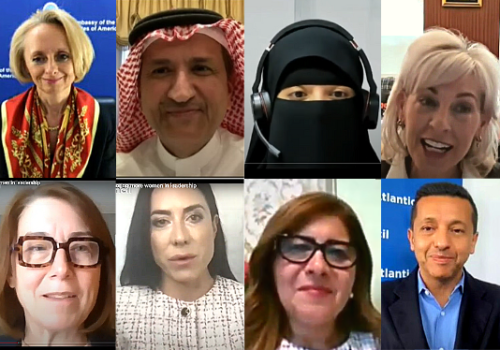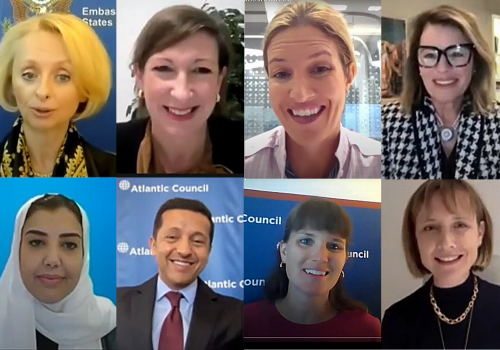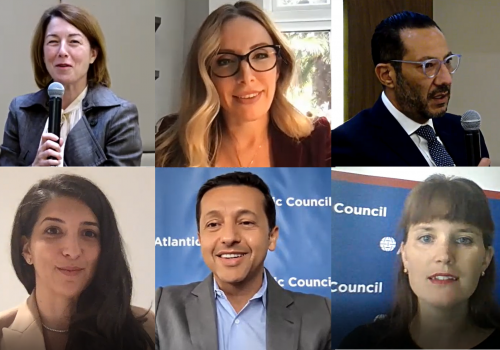New laws in Saudi Arabia support women in business, and society is catching up quickly
On September 28, the Atlantic Council’s empowerME initiative held a discussion on regulations and laws that impact women in business in Saudi Arabia. The event was moderated by The Cohen Group Associate Vice President Jaime Stansbury and featured Saudi Arabia’s Small and Medium Enterprises General Authority (Monsha’at) Women Entrepreneurship Department Director Afnan Ababtain, Albright Stonebridge Group GCC Regional Manager Imad Al-Abdulqader, and PepsiCo General Counsel for Saudi Arabia Yara AlZouman.
This was the second in a series of four events for the first cohort of the WIn (Women Innovators) Fellowship launched in Saudi Arabia. The fellowship is led by the Atlantic Council’s empowerME Initiative in cooperation with Georgetown University’s McDonough School of Business with support from US Embassy Riyadh, PepsiCo, and UPS. The American Chamber of Commerce Saudi Arabia’s Women in Business Committee is the program’s in-person event partner. The yearlong program, which is takeing place from March 2022 – March 2023, enables more than thirty Saudi women entrepreneurs to enhance their networks, gain practical knowledge, and develop US-Saudi people-to-people and business ties that will help them scale their business locally, regionally, and globally.
The key points from the discussion are summarized below.
Major changes in Saudi Arabia’s legal landscape that impacted women in recent years
- Imad Al-Abdulqader explained that many wide-ranging changes in Saudi Arabia are occurring simultaneously: “The transformation is a combination, part of five main things: social changes, regulatory changes, restructuring of government, digital formation, and eliminating bureaucracies.” He also noted that the diversification of the economy is also a key change underway, and all these shifts have synergy and build on each other.
- Al-Abdulqader said that “the most important change…happened in July 2019 when the government went through different laws and regulations, line by line, and struck out anywhere that says a woman needs somebody’s permission to do anything.” This allowed women to gain independence, including equal travel and mobility rights. He added that in 2016, “One of the best things that happened was the removal of the Committee for the Promotion of Virtue and the Prevention of Vice.” This committee was enforcing a strict interpretation of a moral code that wasn’t written down anywhere, he explained, and its dismantlement helped propel women’s independence and equality in work. In addition, in 2017, the Ministry of Labor issued sexual harassment laws for the workplace that protect women from unwanted advances.
- Afnan Ababtain agreed with Al-Abdulqader and noted that the data shows how much Saudi Arabia has changed. She said: “In 2016, the percentage of women [leading their own startups] was less than 21 percent, whereas today we’ve reached 45 percent.” Moreover, Saudi Arabia’s Small and Medium Enterprises General Authority (Monsha’at) had a clear goal to “increase Saudi women in the workforce from 20 percent to 30 percent” and the country has “passed that goal by achieving 33 percent female workforce participation,” said Ababtain.
- AlZouman asserted that PepsiCo is a huge advocate for diversity, championing it both internally and externally. She noted that PepsiCo has lines in their plants operated fully by women and that the company has women executives. When reforms in the Kingdom accelerated, she said: “PepsiCo changed our work culture; we implemented programs to help newly starting female laborers to adjust to the workplace.”
- AlZouman also explained the ways the laws support women in the workplace. For example, if a workplace has more than fifty employees, they are required to have an on-site daycare for women employees.She stated that “the labor laws are extremely protective and enabling in the workplace” and that she feels extremely supported by them. She added that at times she’s even felt the laws give unfair leverage to employees rather than employers.
- “Thinking about the situation when I first started my career in 2010, and then seeing how everything is right now, it’s extremely surreal I cannot believe it. It’s like a cultural shock while I’m living it. Thank God, its going in the right direction”, AlZouman reflected on her 10+ years career in Saudi Arabia. She explained how when Saudi companies first started implementing new work reforms, it was a challenge. However, due to the persistence of women like her, employees are starting to adjust to these social changes.
Areas where change is still needed to boost women’s workforce participation and ability to start businesses
- Ababtain explained that Monsha’at works to empower female entrepreneurs by “looking into the existing women who are in the market” to understand what kind of challenges they are facing. These challenges could be recognition, access to the market, or access to finance. She discussed the multiple ways Monsha’at offers support to women entrepreneurs: free consultations at four SME support centers throughout the country, access to finance, and a free app for mentoring. She said that Monsha’at also encourages women with traditional businesses to incorporate technology into their businesses, and she noted that Monsha’at encourages women entrepreneurs to start childcare businesses given the laws requiring many companies to provide this service.
- Because of the rapid change, some parts of the society may still be resistant to the new landscape. Al–Abdulqader pointed out that there are ways to accelerate this new reality. “Depending on what sector or position you’re in, it will move at different speeds but still move forward. For example, seeing more representation of female leaders will accelerate this new norm.” He added that the “private sector is a little behind, but they will catch on.” As time goes on, the Kingdom will inevitably encounter bumps just like any or nation undergoing a huge transformation would, he added.
- Ababtain mentioned the importance of ensuring gender equality in leading companies, noting: “Although 45 percent of business owners in Saudi are women, we want to ensure that these are quality businesses” to make sure that all their hard work isn’t going to waste.
- While the government has been investing in women’s higher education for decades, Al-Abdulqader pointed out that in the past, “women’s employment was limited to health care and education for girls.” This has already begun to change, especially as more sectors such as tourism and entertainment develop rapidly, opening up new employment possibilities.
Amira Attia is a Program Assistant with the Atlantic Council’s empowerME Initiative at the Rafik Hariri Center for the Middle East.
Further reading
Tue, Jun 14, 2022
Promoting more women in leadership is “a business imperative” and key to unlocking economic prosperity, say top executives
Event Recap By Allison Holle
On June 7, the Atlantic Council’s empowerME Initiative held a workshop on "Balance of power: Promoting more women in leadership."
Mon, Nov 8, 2021
Top women execs on leading “deliberate” organizational change, fostering diversity and inclusion, and coping with challenges
Event Recap By Stefanie Hausheer Ali
On November 2, the Atlantic Council’s empowerME Initiative held a workshop on “Women in senior management: Masterclass in leadership.”
Mon, Oct 18, 2021
New opportunities for MENA women to plug into global commerce
Event Recap By Stefanie Hausheer Ali
Atlantic Council’s empowerME Initiative held a workshop on “Women in the global supply chain: The importance of increasing women's access.”


